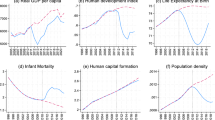Abstract
The US economy is facing, as are many other economies across the globe, the challenge of overcoming the current recession while having no single satisfactory solution to follow. A result of globalisation is that countries are increasingly interconnected, especially in terms of their economies; consequently, decisions taken in the US will have an effect overseas. After assessing the Obama administration’s spending plans in the areas of finance, energy, health care and taxation, Diana Furchtgott-Roth argues that cutting individual tax rates is the most effective measure for overcoming the crisis. A programme to enhance growth will not only restore confidence in the American economy but will also be of benefit to global economies.
Similar content being viewed by others
References
American recovery and reinvestment act of 2009. H.R.1. 111th Congress, 1st session
Buchanan JM, Richard EW (1977) Democracy in deficit: the political legacy of Lord Keynes. Academic Press, New York
Buchanan JM, Geoffrey B (1980) The power to tax: analytical foundations of a fiscal constitution. Cambridge University Press, New York
Calomiris CW (2009). Helping wall street—and main street. Forbes.com, 21 January. Opinions. http://www.forbes.com/2009/01/21/bailouts-banks-foreclosures-oped-cx_cc_0121calomiris_2.html. Accessed 16 March 2009
Carter J (1977). Primary sources: the president’s proposed energy policy. American experience. Public broadcasting service, 18 April. Transcript. http://www.pbs.org/wgbh/amex/carter/filmmore/ps_energy.html
Congressional Budget Office (2009). Congressional budget office cost estimate. H.R.2. Children’s health insurance program reauthorization act of 2009. 11 February. http://www.cbo.gov/ftpdocs/99xx/doc9985/hr2paygo.pdf. Accessed 16 March 2009
Elmendorf DW (2009). Committee on finance, United States senate. Testimony on options for expanding health insurance coverage and controlling costs. 25 February. Congressional budget office, Washington. http://finance.senate.gov/hearings/testimony/2009test/022509detest.pdf
Energy Information Administration (2009). Electric power monthly, 13 February. http://www.eia.doe.gov/cneaf/electricity/epm/epm_sum.html. Accessed 16 March 2009
Gentry WM, Glenn Hubbard R (2004). Tax policy and entry into entrepreneurship. Unpublished article. http://www.williams.edu/Economics/gentry/Tax%20Policy%20and%20Entrepreneurial%20Entry_6-10-04.pdf
Gruber J, Emmanuel S (2002) The elasticity of taxable income: evidence and implications. J Public Econ 84:1–33
Krugman P (2008). Franklin Delano Obama? The New York Times, 10 November. Opinions. http://www.nytimes.com/2008/11/10/opinion/10krugman.html. Accessed 16 March 2009
Lucas RE (2007). Mortgages and monetary policy. Wall St J, 19 September. Opinions. http://online.wsj.com/article/SB119017085710932141.html?mod=opinion_main_commentaries. Accessed 16 March 2009
Obama B (2009). Remarks of President Barack Obama—address to joint session of congress. 24 February. Transcript. http://www.whitehouse.gov/the_press_office/remarks-of-president-barack-obama-address-to-joint-session-of-congress
Prescott EC (2005) The elasticity of labor supply and the consequences for tax policy. In: Auerbach AJ, Hassett KA (eds) Toward fundamental tax reform. AEI Press, Washington
Prescott EC (2005b). Stop messing with federal tax rates. Wall St J, 20 December. Opinions. http://online.wsj.com/article/SB113503904805326884.html?mod=opinion_main_commentaries. Accessed 16 March 2009
Shlaes A (2007) The forgotten man: a new history of the great depression. HarperCollins, New York
United States. Bureau of Economic Analysis (2009). US international trade in goods and services. January 2009. Press release, 13 March 2009. News release, 12 May. http://www.bea.gov/newsreleases/international/trade/2009/pdf/trad0309.pdf. Accessed 12 May 2009
United States. Department of Health and Human Services (2009). SCHIP provides health coverage to 7.4 million children in 2008. News release. 26 January. http://www.hhs.gov/news/press/2009pres/01/20090126a.html. Accessed 16 March 2009
United States. Department of Treasury (2009a). Financial stability plan fact sheet. 10 February. http://financialstability.gov/docs/fact-sheet.pdf. Accessed 16 March 2009
United States. Department of Treasury (2009b). Secretary Geithner introduces financial stability plan. Press release. 10 February. http://www.treas.gov/press/releases/tg18.htm. Accessed 16 March 2009
Author information
Authors and Affiliations
Corresponding author
About this article
Cite this article
Furchtgott-Roth, D. The future global role and development of the US economy. European View 8, 39–46 (2009). https://doi.org/10.1007/s12290-009-0073-y
Published:
Issue Date:
DOI: https://doi.org/10.1007/s12290-009-0073-y




